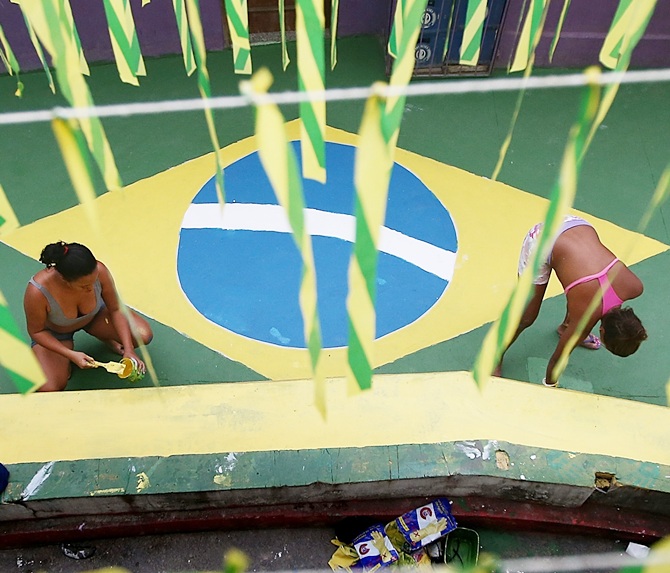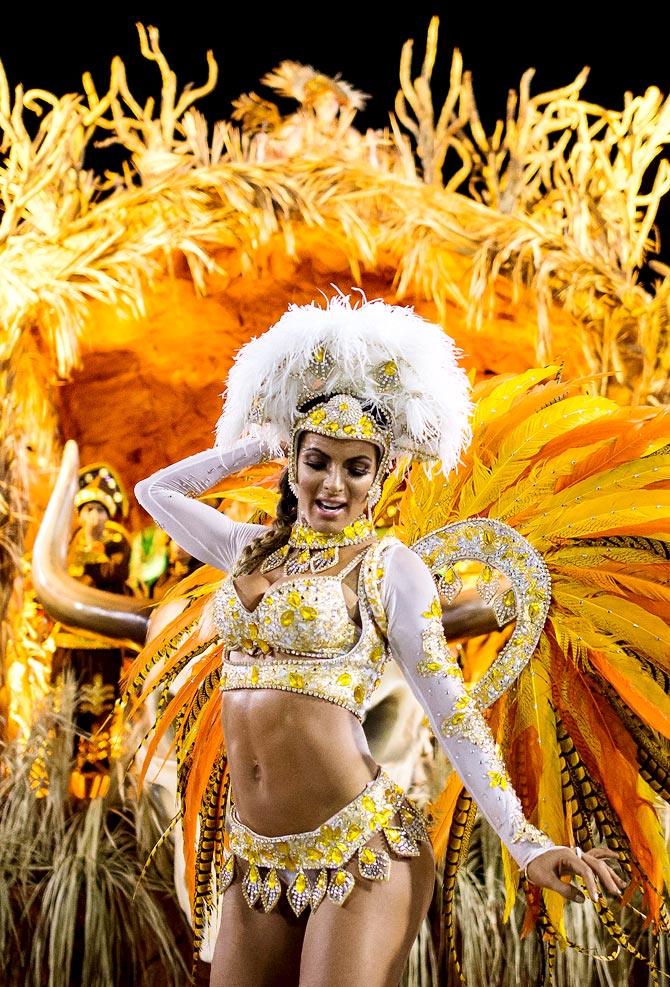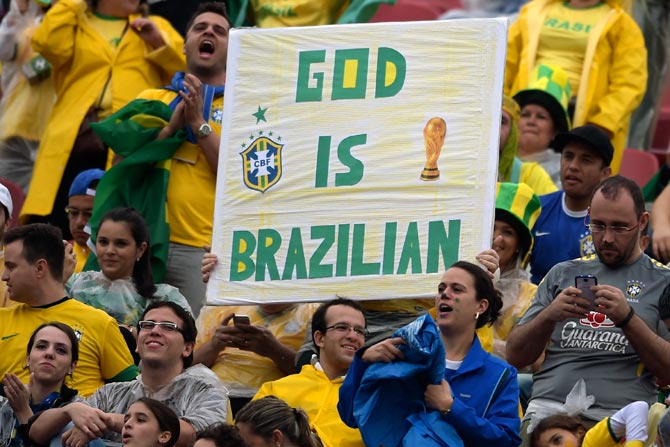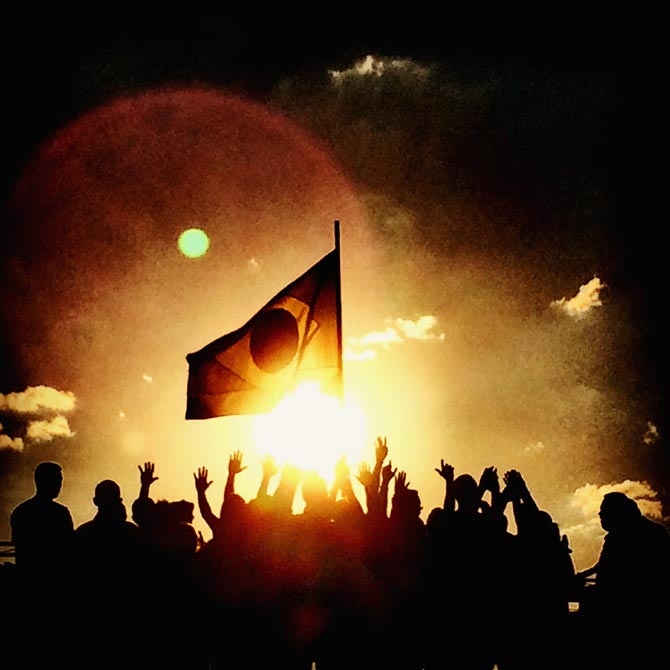Photographs: Mario Tama/Getty Images
After inviting the world to its party and spending billions of dollars to put on a show, Brazil suddenly seems reluctant to dance.
The month-long World Cup soccer tournament kicks off on Thursday in what many people see as the sport's spiritual home, but the mood on the streets is subdued.
Delays in building and updating World Cup stadiums, airports and other infrastructure combined with anger over the $11.3 billion price tag have fueled protests that erupted in violence last year and dampened the enthusiasm of even die-hard fans.
Mounting allegations of corruption inside world soccer body FIFA have done nothing to help.
- 10 players to watch out for at the World Cup in Brazil
- Please click NEXT for more...
'We just want to have some fun and we are trying hard to find it'
Image: A performer during the 2014 Brazilian Carnival at Sapucai Sambadrome in Rio de JaneiroPhotographs: Buda Mendes/Getty Images
Brazilians say they will find their trademark exuberance once the goals start rolling in. For now, though, many of the international soccer fans descending on a country renowned for its Carnival celebrations, samba and soccer are disappointed.
"It's very hard to find things that are for us, the fans," said Vedran Lesic, part of a group of Croatian fans decked out in their national team's red and white as they walked through Sao Paulo on Wednesday. "We just want to have some fun and we are trying hard to find it."
The most festive visitors have resorted to making their own fun, carrying their national flags around the city, drinking in the streets and singing together as amused locals look on.
Otherwise the atmosphere is flat in Sao Paulo, the country's buttoned-down business center, which hosts the opening match between Brazil and Croatia on Thursday.
An expected explosion of Brazil's green and yellow has been slow to materialize and graffiti attacking FIFA and Brazilian politicians highlights the anger over poor public services.
"It's depressing. It's like people don't have the enthusiasm they had in other years, especially for a country that has football in its soul," said Cecilia Salazar, a 64-year-old shopkeeper from Argentina who was in Sao Paulo with her husband and has tickets to see their national team play in Porto Alegre.
'Let's hope the Brazil team is as badly-prepared as this'
Image: Brazilian football fansPhotographs: Buda Mendes/Getty Images
Poor organization caused huge delays in some of the key World Cup investment projects and workers in a dozen host cities are racing against the clock to have stadiums, airport terminals and access roads ready on time.
Some projects, such as a bullet train between Sao Paulo and Rio de Janeiro, never left the drawing board. Others are only partially completed or have been put on ice until after the World Cup.
"This is amazing. They've had years to get ready, but we've flown into a work-site," laughed Colombian businessman Manuel Pereira, 35, as he landed at Belo Horizonte airport, where metal bars and wires stuck out of walls and orange-suited workmen wandered round the concourse doing an array of last-minute jobs.
"Let's hope the Brazil team is as badly-prepared as this, then maybe Colombia can win the tournament!"
In Natal, hundreds of workers are rushing to prepare the area around the stadium before the match between Mexico and Cameroon on Friday. In one toilet block, a line of more than 20 ceramic bowls are exposed to the hot sun, still awaiting walls and doors to protect the modesty of their future users.
'Brazilians aren't happy with this World Cup'
Image: Brazilian fans celebratePhotographs: Warren Little/Getty Images
Many Brazilians believe the money spent on building new stadiums in cities that only have small local teams should have gone instead to improving social services. Support for hosting the World Cup has fallen from nearly 80 percent in 2008 to less than 50 percent this year, according to pollster Datafolha.
To stem the criticism, President Dilma Rousseff took to national television late on Tuesday defending public investments and urging her compatriots to give visiting fans a warm welcome.
"We did this, above all, for Brazilians," she said, adding that the public works built for the tournament "won't leave in suitcases along with the tourists."
An economic boom that pulled more than 30 million people out of poverty has fizzled in the last four years and hundreds of thousands took to the streets in demonstrations last year. Further protests are expected during the tournament.
"Brazilians aren't happy with this World Cup. In another year, all this would be crazy with decorations," said Anelio de Castro, pointing to the streets of his Sao Paulo neighborhood.
"They wasted a lot of money on those stadiums when the priority should have been our awful health care system," he said. "I've always rooted for Brazil, but right now I want the team to lose so people will vote out the president."
'This is Brazil! I want it to be a little crazy'
Image: A Brazil fan poses for a photo near the Christ Redeemer in Rio de JaneiroPhotographs: Warren Little/Getty Images
Still, the mood may change quickly when the action starts, especially if the Brazilian team plays well and goes on to win the World Cup for a record sixth time.
Juliana Likovac, a Croatian fan in Rio with her boyfriend, said she was not worried about organizational delays or even possible protests. Having already gone to the 2006 World Cup in Germany, she is hoping for a different experience.
"I have seen order," she said. "This is Brazil! I want it to be a little crazy."







Comment
article